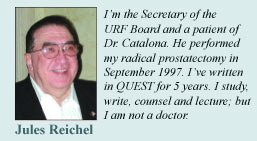The Controversial Topic of Nutrition and Supplements
“Every unsolved disease cries out for garlic around the neck.” 
By Jules Reichel Does good nutrition prevent or cure prostate cancer?
When I was a little boy, a kid on the next block had a distorted body from polio. I recall being afraid to talk to him. I asked my mom whether I could wear garlic around my neck like the other boys, to protect myself against Johnny’s disease? She said, “We don’t believe in that.”
Others are not so clear in their disbeliefs and when the disease is as serious and frightening as prostate cancer, it is tempting to reach out for comforting approaches that permit us to feel we are taking back control of our lives.
We are too sophisticated to wear garlic, but many patients use ordinary nutrition in much the same way. I’m a patient too, and I understand the need.
However, after decades of formal tests, researchers have concluded that the likelihood of ordinary nutrition assisting in the treatment of prostate cancer is very low. By “ordinary nutrition,” I mean the food regimen that a professional nutritionist might recommend.
One example of such a result is from the PLCO (Prostate, Lung, Colorectal, Ovarian) cancer screening trial. They reported: “Overall, dietary or supplement intake of vitamin E, vitamin C, or beta-carotene (which were believed to be helpful) was not associated with prostate cancer incidence,” other than in special groups such as smokers.
For those who think that I have sidestepped the issue with the term “ordinary nutrition” when I should have used more stringent vegetarian criteria, here’s what a typical study (76,000 people) finds: “There were no significant differences between vegetarians and non-vegetarians in mortality from (a list of cancers) prostate cancer.” There was, however, significant benefit with heart disease especially at younger ages.
Ordinary nutrition is an unlikely candidate for treatment.
Prostate cancer is not the kind of disease that anyone would expect ordinary nutrition to cure. The following examples explain why.
•Dr. Catalona has written, “With the Human Genome Project of the 1990’s, it became apparent to me that all cancer is really genetic in origin. Cancer occurs because something goes awry with a patient’s DNA. Some of those changes could be inherited from parents, and others are acquired by exposure to things in the world. But ultimately it’s genetic.”
It’s hard to believe that humans would ever have survived if changes in diet were easy ways to control our DNA processes. In fact, it seems more likely that DNA changes are somehow protected from dietary influences.
•Dietary influences, if important at all, would take place long before the disease was diagnosed. Young men who were given PSA tests in their early 30’s and already had higher scores than their peers (although much below diagnostic thresholds), were observed to have a much higher probability of diagnostically significant PSA scores later in life.
Even if we were to believe that careful ordinary nutrition could help treat prostate cancer, the opportunity to provide benefit would need to begin when men were less than 30. When a man is diagnosed with prostate cancer at possibly 60 years of age, it is of no benefit to fill him with despair based on what he might have done long ago.
•After over 30 years of highly funded study, some success with drugs is now occurring – at least in clinical trials. The medical study community has only had success in stopping the advance of prostate cancer by the use of potent drugs.
One of the currently “hot” worldwide trials is called Ascent-2. Patients with advanced prostate cancer are given a combination of the chemotherapy drug Taxotere along with a very intensified form of Vitamin D (Calcitriol). In the prior trials in this series, they have extended survival of these most advanced cases by about two years longer than expected, and that implies that many men will live much longer than that. The primary endpoint of the study is to determine what percentage of men achieves a 50% or more reduction in PSA.
This trial illustrates that to believe in the power of ordinary nutrition to change the course of prostate cancer, one would have to believe that ordinary foodstuffs could have similar effects to these drugs.
Yes, supplements might help fight prostate cancer.
Some expert medical oncologists advocate for the benefits of supplements based on their clinical observations, although they tend to offer small studies as their scientific basis.
Most importantly, high dose supplements are non-FDA-approved drugs by another name, and they can have drug-like benefits (and risk as well).
I have followed the Vitamin C cancer controversy for many years, including the work of the Nobel Laureate Dr. Linus Pauling and his advocacy of taking 10 grams per day of Vitamin C (1976). Many medical analysts, especially those at the Mayo Clinic, debunked his approach by saying that it didn’t work and 10grams of Vitamin C was excessive and possibly dangerous.
But in 2005 a small study was published at the NIH on three extremely sick patients with different kinds of cancer.
The first patient had kidney cancer that had metastasized to the lung. She was given intravenous (IV) injections of 65 grams of Vitamin C for 10 months. Her cancer was in remission for 5 years and then returned.
The second patient had metastasized bladder cancer. He was given 30-gram IV injections of Vitamin C for 4 years. Nine years after diagnosis the patient is in good health with no signs of disease.
The third patient had lymphoma invading her spinal muscle and bone. She received 15-gram IV injections of Vitamin C for about a year. Ten years after diagnosis the patient is in good health.
This use of very high dose Vitamin C given by intravenous injection is well known in the complementary medical community but this time is the first that I saw an NIH study with similar conclusions.
The reason that this result is such a surprise is that the Mayo Clinic did three major studies of Dr. Pauling’s approach and in each case found that Vitamin C was no better than a placebo. Many later studies supported Pauling’s concept, but no one seemed to believe them. A Cedars-Sinai study said, “Do not take a vitamin C supplement. If you are eating…you will be getting an adequate amount of Vitamin C.”
In retrospect one can see the problem is not that Vitamin C is of no value. It’s that since there were no drug trials no one knew how large a dose to give so that it did any good – and swallowing pills often doesn’t provide an effective dose. Dosage and protocol for use are major problems for all use of supplements.

This Vitamin C example illustrates a broad potential for benefit and also difficult problems in the use of many supplements. This example should not be interpreted that Dr. Catalona advocates taking high doses of Vitamin C.
Bottom Line
When a patient has been given a harsh diagnosis and is being asked to make serious life decisions, it becomes very difficult to maintain a healthy balance of realism and cautious optimism.
Nothing has been shown to be very helpful for prostate cancer other than the established therapies when carried out by expert doctors. These therapies provide lots of help and, best of all, they come with understanding as to how to use them.
However, the naysayers of supplements are also not correct. The use of supplements is an emerging therapy area with a lot of promise – but good medical guidance is needed. Despite the absence of such guidance, many men take supplements – often in large amounts and impressive variety. Unfortunately, most of what is consumed is unlikely to be useful.
Dr. Catalona advocates taking an inexpensive multivitamin, selenium 200 micrograms per day, and lycopene 30 mg per day.
Feedback is Encouraged 
You can write to Dr. Catalona at “contact us” on the website www.drcatalona.com. Or you can write to me: jules105@aol.com. My prior thirteen articles are on the website under Quest articles—click below my picture.











